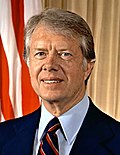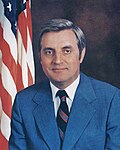Negotiations
The tentative schedule for the debates, reported in August 1980, was as follows: [1]
The 1980 election featured a major third-party candidate, John B. Anderson. The League of Women Voters allowed for Anderson to participate in the debate if he polled above 15%. [2]
The Carter campaign, believing that a three-way debate between Jimmy Carter, Ronald Reagan, and Anderson, would boost Anderson's campaign, tried to push for an earlier debate only featuring Carter and Reagan. [2] This plan was supported by the chairs of the Democratic and Republican National Committee. [3] The two-person debate did not materialize, and Carter declined to debate alongside Anderson. [4]
The vice presidential debate was canceled on September 29, days before it was scheduled to be held. George H. W. Bush and Walter Mondale refused to attend, leaving only Anderson's running mate Patrick Lucey accepting the invitation. [5]







